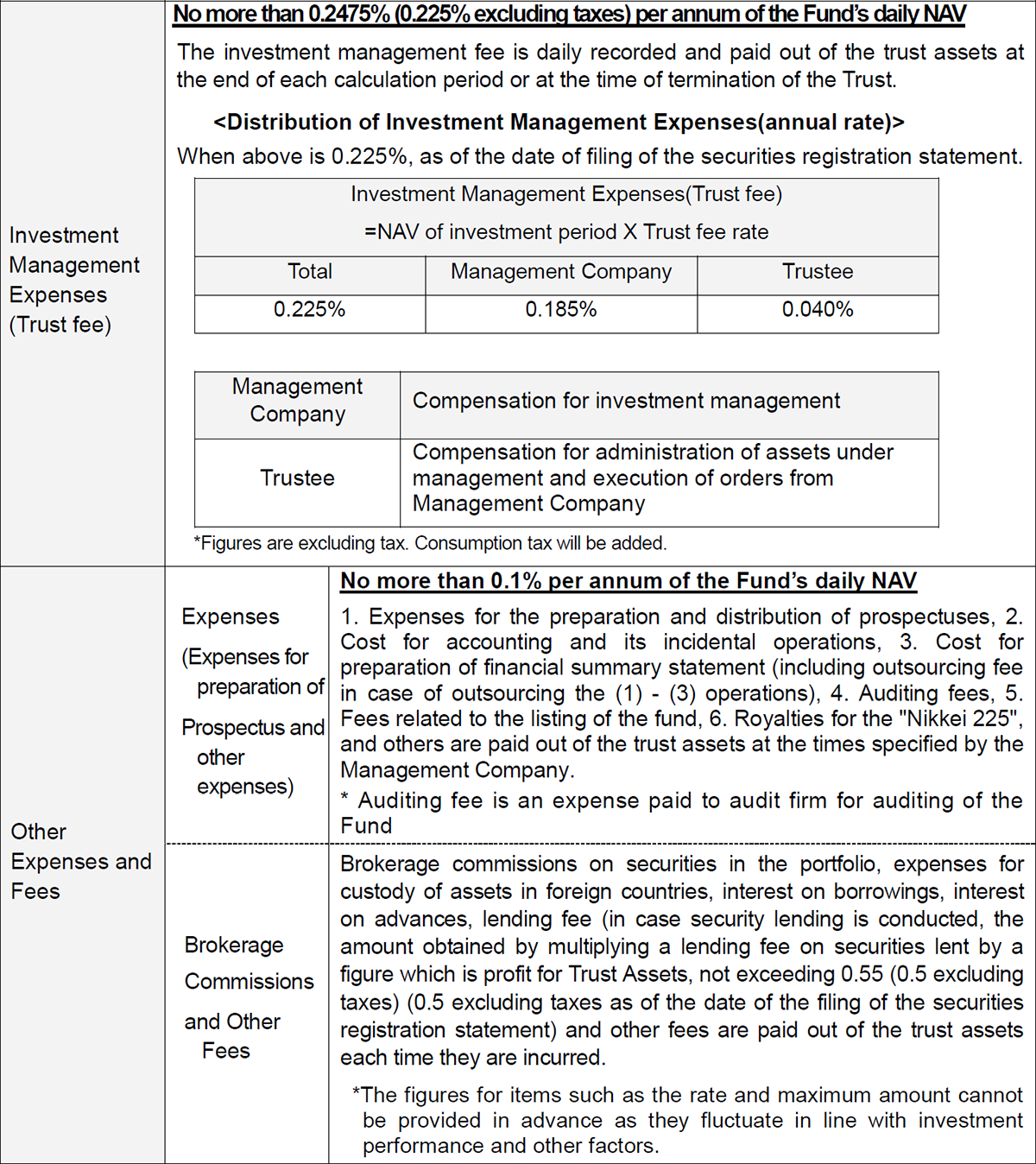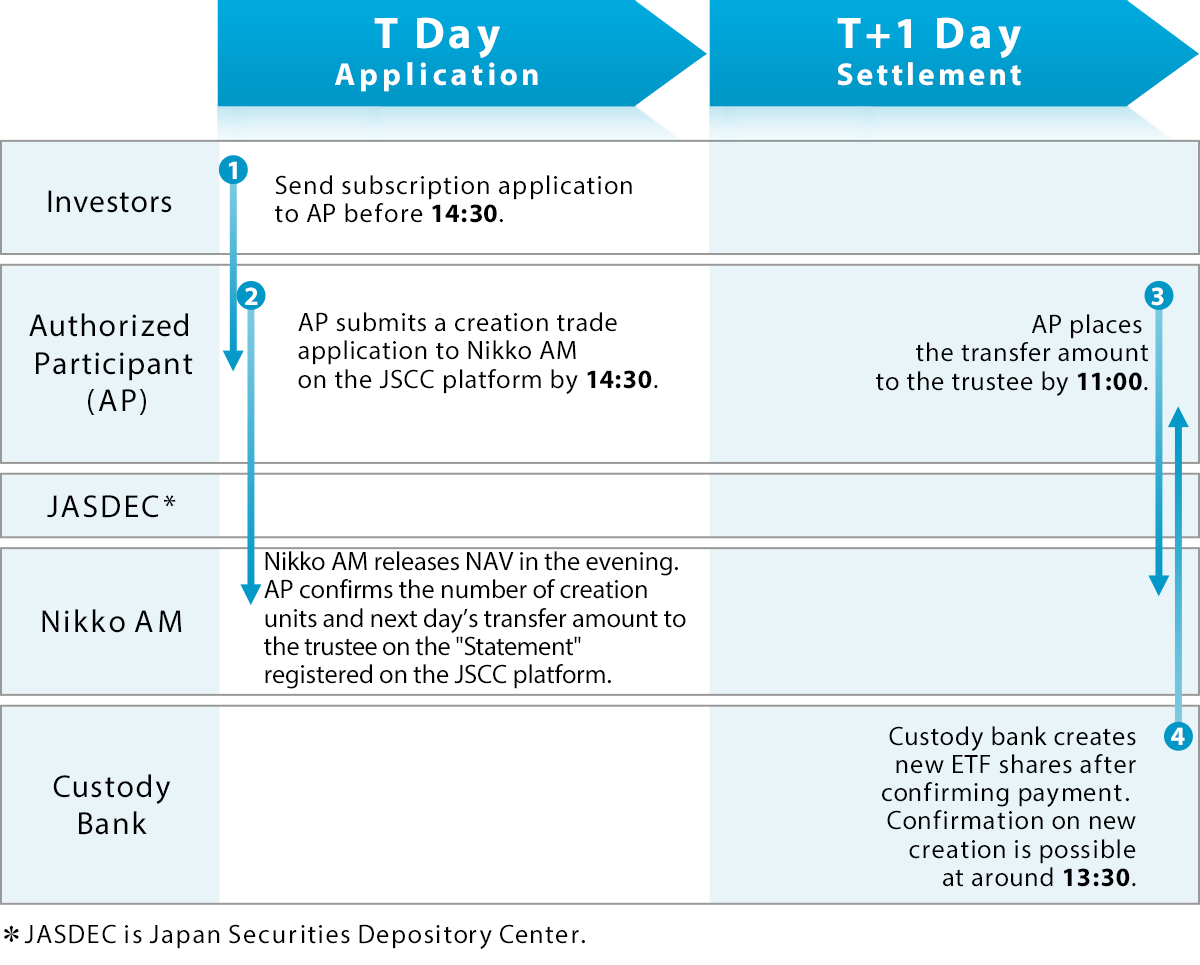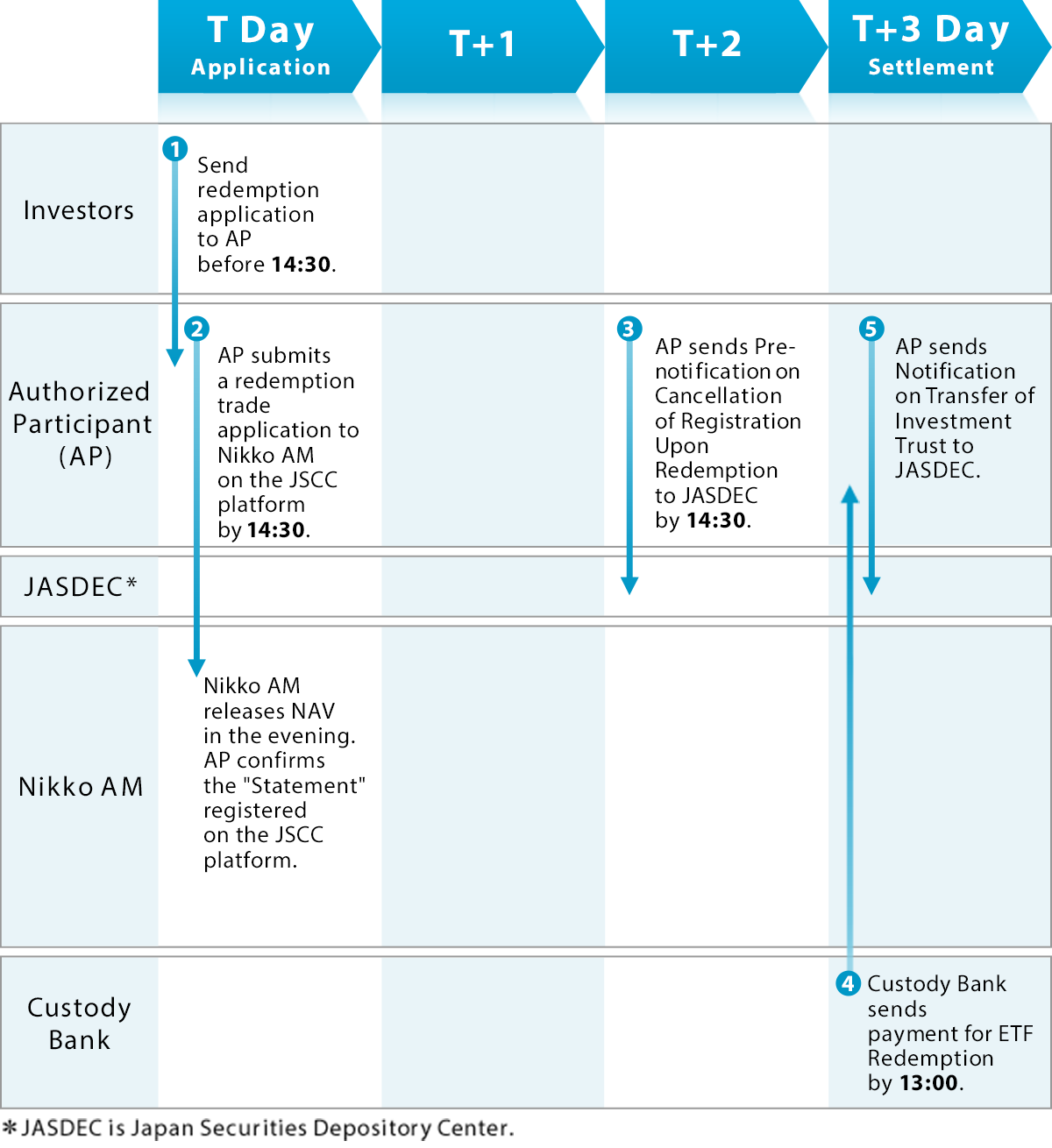On September 1, 2025, Nikko Asset Management Co., Ltd. will change its name to Amova Asset Management Co., Ltd.
The Fund seeks the net asset value per unit to track the performance of the Nikkei 225 by investing in shares of the component stocks of the Nikkei 225, and maintaining, in principle, a portfolio constructed consistent with the calculation method of the Nikkei 225.
Key information
| Name: | Listed Index Fund Nikkei 225 (Mini) | |
| Code: | 1578 |
Net Asset Value and Performance
| Fund Name | Listed Index Fund Nikkei 225 (Mini) Open-end/Domestic/Equities/ETF/Index type |
| Listed Exchange | Tokyo Stock Exchange |
| Issue Code | 1578 |
| Targeted Investments | This fund mainly invests in stock issues adopted for the Nikkei Stock Average. |
| Date Listed | 25 March 2013 (launched on 22 March 2013) |
| Exchange Trading Unit | 1 unit |
| Trust period | Unlimited |
| Computation Period | Every year, 9 Jan - 8 Jul, 9 Jul - 8 Jan |
| Closing Date | Every year, the 8th day of January and July |
| Dividends | All revenue from dividends arising from the trust assets will be, in principle, paid as dividends on the last day of the fiscal year after deducting expenses. *There is no guarantee on the payment or the amount of dividend. |
Fund Expenses
■Expenses to be borne directly by investors
| Subscription Fee | Independently set by Distributors *Please contact your Distributor for further information. *Subscription Fee is compensation for explanation and information providing about the Fund or investment environment, and is also including expense of clerical processing of the subscription. |
| Exchange Fee | Independently set by Distributors *Please contact your Distributor for further information. *Exchange Fee is compensation for clerical processing of the exchange. |
| Amount to be Retained in Trust Assets | None. |
■Costs paid indirectly by the customer for the trust assets (paid from the fund)
| TER (Total Expense Ratio) |
0.29% (TER includes Trust Fee, management fee and other costs below) Please refer to the prospectus for details. |

The total amount of expenses of the Fund to be borne by investors varies according to holding length and investment status, and thus cannot be shown.
Major Investment Restrictions
|
Trustee Companies
|
* The Nikkei 225 is an equity index developed by Nikkei Inc., and is calculated using 225 stocks representing the equity market from the component stocks of the Prime Market of the Tokyo Stock Exchange. The Nikkei 225 is a Dow-style adjusted price-weighted average, and the divisor is adjusted as required to maintain continuity.

* The current calculation method began in 1950 and retroactively calculated back to 1949. The Nikkei 225 is the oldest Japanese stock index, and is well known among market participants in Japan and abroad. The component shares are adjusted yearly based on market liquidity and sector balance. It is also reviewed based on the merging of component share and delisting.
Further Information
Japan Exchange Group (JPX)
Japan Exchange Group publishes summaries and lists of the ETFs, as well as other valuable information on their website.
S&P Global
- Listed ETF iNav
Please click this link to see the iNAV.
Nikkei Inc.
The current calculation method was first adopted in 1950, and the Index is calculated retroactive to 1949. The Nikkei Stock Average has the longest history among stock indices in Japan, and is well known by investors and others concerned with the stock market in Japan and around the world. The 225 components are reviewed annually based on market liquidity and sector balance criteria. In addition, they are reviewed in response to mergers or delisting of component issues.
*Link to external sites.
Copyright and Other Rights of the "Nikkei 225"
The "Nikkei 225" is a copyrighted work calculated through a method developed independently by the Nikkei, and Nikkei Inc. holds the copyrights and all other intellectual property rights related to Nikkei 225 itself and its calculation method.
All trademark rights and other intellectual property rights relating to trademarks of "Nikkei" and "Nikkei 225" belong to Nikkei Inc.
Management of the fund is the responsiblity of the management company, and Nikkei Inc. has no responsiblity for its management or the transactions of the fund.
Nikkei Inc. has no obligation to continue to publish Nikkei 225, and are not responsible for mistakes, delays or suspensions in its announcement.
Nikkei Inc. has the right to change the component shares, calculations method and other contents of Nikkei 225 and to cancel its announcement.
- 21 Feb 2025 — Earnings Report for Fiscal Year ended Jan 2025
- 21 Aug 2024 — Earnings Report for Fiscal Year ended Jul 2024
- 21 Feb 2024 — Earnings Report for Fiscal Year ended Jan 2024
- 21 Aug 2023 — Earnings Report for Fiscal Year ended Jul 2023
- 21 Feb 2023 — Earnings Report for Fiscal Year ended Jan 2023
- 19 Aug 2022 — Earnings Report for Fiscal Year ended Jul 2022
- 21 Feb 2022 — Earnings Report for Fiscal Year ended Jan 2022
- 20 Aug 2021 — Earnings Report for Fiscal Year ended Jul 2021
- 19 Feb 2021 — Earnings Report for Fiscal Year ended Jan 2021
- 20 Aug 2020 — Earnings Report for Fiscal Year ended Jul 2020 (9 Jan 2020 - 8 Jul 2020)
- 20 Feb 2020 — Earnings Report for Fiscal Year ended Jan 2020(9 Jul 2019 – 8 Jan 2020)
- 21 Aug 2019 — Earnings Report for Fiscal Year ended Jul 2019 (9 Jan 2019 - 8 Jul 2019)
- 21 Feb 2019 — Earnings Report for Fiscal Year ended Jan 2019 (9 Jul 2018 - 8 Jan 2019)
- 21 Aug 2018 — Earnings Report for Fiscal Year ended Jul 2018 (9 Jan 2018 - 8 Jul 2018)
- 21 Feb 2018 — Earnings Report for Fiscal Year ended Jan 2018 (9 Jul 2017 - 8 Jan 2018)
- 21 Aug 2017 — Earnings Report for Fiscal Year ended Jul 2017 (9 Jan 2017 - 8 Jul 2017)
- 21 Feb 2017 — Earnings Report for Fiscal Year ended Jan 2017 (9 Jul 2016 - 8 Jan 2017)
- 19 Aug 2016 — Earnings Report for Fiscal Year ended Jul 2016 (9 Jan 2016 - 8 Jul 2016)
- 19 Feb 2016 — Earnings Report for Fiscal Year ended Jan 2016 (9 Jul 2015 - 8 Jan 2016)
- 20 Aug 2015 — Earnings Report for Fiscal Year ended Jul 2015 (9 Jan 2015 - 8 Jul 2015)
- 20 Feb 2015 — Earnings Report for Fiscal Year ended Jan 2015 (9 Jul 2014 - 8 Jan 2015)
- 21 Aug 2014 — Earnings Report for Fiscal Year ended Jul 2014 (9 Jan 2014 - 8 Jul 2014)
- 20 Feb 2014 — Earnings Report for Fiscal Year ended Jan 2014 (9 Jul 2013 - 8 Jan 2014)
- 21 Aug 2013 — Earnings Report for Fiscal Year ended Jul 2013 (22 Mar 2013 - 8 Jul 2013)
This Fund can be applied for as a cash creation and a cash redemption at Authorised Participants in addition to the Tokyo Stock Exchange.
Authorized Participants
- SMBC Nikko Securities Inc.
- ABN AMRO Clearing Tokyo Co., Ltd.
- Barclays Securities Japan Limited
- BNP Paribas Securities Japan Ltd.
- Citigroup Global Markets Japan Inc.
- Daiwa Securities Co. Ltd.
- Goldman Sachs Japan Co.,Ltd.
- JPMorgan Securities Japan Co., Ltd.
- Mitsubishi UFJ Morgan Stanley Securities Co., Ltd.
- Mizuho Securities Co., Ltd.
- Nomura Securities Co., Ltd.
- Societe Generale Securities Japan Limited
- Tokai Tokyo Securities Co.,Ltd.
Daily Creation and redemption are based on ETF's NAV calculated in early evening. Confirm non-tradable days by referring to trading calendar on our official homepage. Basket for creation is continually-updated on our official homepage.
Basically sell/buy underlying asset at last price of T day's market.
The flow chart below is showing the creation/redemption process for Nikko AM ETFs. Please note that transactions cannot be processed for days on which applications are not accepted.
Creation Flow for Cash Creation/Redemption Type ETFs

Redemption Flow for Cash Creation/Redemption Type ETFs

Investors are not guaranteed the investment principal that they commit. Investors may incur a loss and the value of their investment principal may fall below par as the result of a decline in market price or NAV. All profits and losses arising from investments in the Fund belong to the investors (beneficiaries). This fund is different from saving deposit.
The Fund invests primarily in stocks. The NAV of the Fund may fall and investors may suffer a loss due to a decline in stock prices or deterioration in the financial conditions and business performance of an equity issuer.
Major risks are as follows:
1. Price Fluctuation Risk
Stock prices fluctuate as they are affected by information on the company's growth rate and profitability as well as changes in such information. They also fluctuate as they are affected by economic and political conditions in Japan and abroad. There is a risk that the Fund will suffer material losses if unexpected changes occur in stock price or liquidity.
2. Liquidity Risk
The Fund may incur unexpected losses when the size of the market or trading volumes is small. The purchase and sale prices of securities are influenced by trading volume, resulting in the risks that they cannot be traded at prices expected to be realized in light of the prevailing market trend, sold at the estimated prices, or that the trading volume is limited regardless of the level of prices.
3. Credit Risk
There is a risk that the Fund will incur material losses in the event of a serious crisis that directly or indirectly affects the business of a corporation in which the Fund invests. The prices of stocks of issuers may substantially decline (possibly to zero) due to fears of default or corporate bankruptcy, which can contribute to decline in the Fund NAV.
This fund may manage capital with short-term financial assets such as call loans or transferable certificates of deposit and may incur losses as a result of default on the part of the counterparty. This may result in a decline in the fund's NAV.
4. Currency Fluctuation Risk
For foreign-currency-denominated assets, in general, if the yen is stronger than the currencies of such assets, the fund's NAV will decline.
5. Security-lending Risk
Lending of securities involves counterparty risks, which are the risks of contractual default or cancellation following bankruptcy, etc., by the counterparty. As a result, the Fund may suffer unexpected losses. Following the default or cancellation of a lending agreement, when liquidation procedures are implemented by using the collateral that is set aside in the lending agreement, the procurement cost of buying back the securities can surpass the collateral value, due to price fluctuations in the market. In such cases, the Fund is required to pay the difference, which may cause the Fund to incur losses.
Risks of Discrepancy between the Nikkei 225 and the NAV
The Fund seeks to match the NAV volatility with that of the Nikkei 225, but it cannot guarantee that movements will be consistent with the Index for the following reasons:
- The Fund may be subjected to a market impact when buying or selling individual stocks as it adjusts its portfolio in response to changes in the stocks that comprise the Nikkei 225 and capital changes among corporations. In addition, the Fund will incur various expenses, including trust fees, brokerage commissions, and audit fees.
- Dividends may be paid by stocks in the portfolio and fees may be earned for securities lent.
- When derivative transactions such as futures are made, there may be disparity between the price movements of such transactions and that of some or all of the constituents of the Nikkei 225.
Discrepancy between the market prices at which stocks are traded on exchanges and the NAV
The Fund is listed on the Tokyo Stock Exchange and the units are traded on that exchange. The market price of the units is affected primarily by the size of demand for the Fund, its performance, and how attractive it is to investors in comparison with their other investments. It is not possible to predict whether the units will sell in the market above or below the NAV.
*Factors that contribute to NAV fluctuations are not limited to those listed above.
Additional Considerations
- These materials are distribution materials created by Nikko Asset Management in order to increase investors' understanding of "Listed Index Fund Nikkei 225 (Mini)"
- The provisions stipulated in Article 37-6 of the Financial Instruments and Exchange Act ("cooling-off period") are not applicable to Fund transactions.
- This Fund differs from deposits or insurance policies in that it is not protected by the Deposit Insurance Corporation of Japan or the Policyholders Protection Corporation of Japan. Furthermore, units purchased from registered financial institutions, such as banks, are exempted from compensation by the Japan Investor Protection Fund.
- When the Fund faces big redemption causing short term cash requirement or sudden change in the main trading market condition, there can be temporal decline in the liquidity of holding assets, resulting in the risks that Fund unable to trade securities at the expected market prices or appraised prices, or encounters limitation in trading volume. This may result in the negative influence on NAV, suspension of redemption applications, or delay in making payment of redemption.
- When applying to invest in the Fund, please make the decision to invest carefully after taking the time to read the delivered pre-agreement document and other relevant materials in detail.


